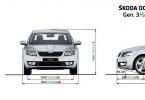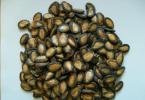Almost a month ago we talked about Chinese - an extended version with a spacious five-seat interior. Now the “stretched” crossover has reached America, and, unlike the Celestial Empire, it will be the only version of the Tiguan on the local market, so the prefix L does not need it. However, the American version has several important differences from the Chinese one.
Compared to the European Tiguan, the wheelbase has become 110 mm longer, that is, the distance between the axles of the long version is the same as that of the platform crossover (2791 mm). And in addition, the creators increased the rear overhang, at the same time changing the shape of the side glazing, so as a result, the American Tiguan is even longer than the Czech relative: 4704 versus 4697 mm (the option for the Celestial Empire is 8 mm more due to the frame of the front license plate).

But if the Chinese Tiguan L is strictly a five-seater, then for America, Volkswagen has prepared a seven-seater version. For front-wheel drive, the third row is already “in the base”, and for all-wheel drive vehicles it is offered for a surcharge. The second row, as in Europe, can move on a skid, but the American version has its own feature - a back divided into three parts (in a ratio of 40:20:40).

The only engine for America is a 2.0 TSI turbo four (184 hp), but it does not work with a preselective “robot”, but with a traditional eight-speed “automatic”, like a large Volkswagen Atlas crossover. The rejection of the DSG gearbox, which is used on cars for Europe, Russia and China, is not accidental: American buyers prefer torque converters because of the comfort and traction properties when towing trailers.

The extended Tiguan for America will be produced at the Volkswagen plant in Mexico. And subsequently, such a version should appear in other markets, including Europe, where the seven-seater crossover will be called the Tiguan Allspace. In Russia, they are about to start selling the usual one, the production of which is already underway in Kaluga.
The basic Trendline package of the new Tiguan Allspace includes roof rails, a Composition Color multimedia system with a Connectivity package (phone interface and USB connector), a multifunction steering wheel, trapezoidal nozzles on the exhaust pipes and a convertible luggage compartment floor. The Comfortline version offers: electric tailgate. The Highline package is equipped with full LED headlights, as well as a Keyless Access system for entering the passenger compartment and push-button engine start. In addition, the updated Tiguan Allspace received the Discover Pro infotainment system with gesture control. The power range of the engines offered for the Tiguan Allspace is from 150 to 240 hp. At the moment, the Volkswagen brand is considering the possibility of selling the seven-seater Tiguan Allspace in Russia. Our benchmark for the starting cost could be about 1,700,000 - 1,750,000 rubles. Another interest is whether the production of new items will be launched at the Russian plant ...
The new Volkswagen Tiguan XL for 7 seats, a review of the new Volkswagen 2017-2018 of the year - photos, price and equipment, specifications and reviews about the 7-seater Volkswagen Tiguan HL. In China, sales of the Volkswagen Tiguan crossover with a wheelbase stretched by 110 mm have started - the model is offered under the name Volkswagen Tiguan L (Volkswagen Tiguan Long) according to price from 211,800 to 315,800 yuan.
In the spring of 2017, the Volkswagen Tiguan XL will make its debut in the automotive markets of North America, Europe and Russia at a price comparable to the cost of the native Skoda Kodiaq soplatform brother.
It should be noted that the main differences between the long version of the Volkswagen Tiguan XL and the regular Volkswagen Tiguan are the longer overall length of the body and the large wheelbase. And also, of course, in a more hospitable cabin, capable of receiving an additional third row of seats as an option, increasing the passenger capacity of the crossover to 7 people.
In a word, it is possible to understand that this is an elongated version of XL in front of us, only by examining the body of the novelty from the side, especially carefully paying attention to the rear of the SUV body, starting from the central pillar. There are larger rear doors, a longer roof line, different glass in front of the C-pillar with a characteristic curve of the window sill line and a more massive stern.
Otherwise, the regular and long versions of the Volkswagen Tiguan are indistinguishable. A modern and strict front end with stylish headlights, a neat false radiator grille and a massive bumper, ideal large wheel arch cutouts, harmonious overall proportions of the body, solid rear with beautiful marker lights.
The headlights, by the way, are offered in three versions: conventional ones with halogen lamps, more advanced ones with LED low and high beams, and the most sophisticated ones with LED lenses that do not blind drivers of oncoming cars. As standard, LED taillights with an original pattern are installed.
The external dimensions of the body of the 2017-2018 Volkswagen Tiguan XL are 4712 mm long, 1839 mm wide, 1673 mm high, with a 2791 mm wheelbase. So the Tiguan XL is 226 mm longer than the regular Tiguan, while the wheelbase is 110 mm longer and the body height is 30 mm longer.
It is clear that such an increase in external overall dimensions has a positive effect on the internal dimensions of the Volkswagen Tiguan XL. Second-row passengers will appreciate more legroom, and the useful volume of the luggage compartment has clearly increased. The standard stretched Tiguan XL (Chinese market Tiguan L) is offered in a 5-seater version with two rows of seats, a 7-seater configuration is a paid option.
As standard and optional equipment, the extended-wheelbase Tiguan gets the same set as the regular version with standard wheelbase dimensions. There is a traditional instrument panel or an advanced digital one with a 12.3-inch screen, an audio system or multimedia systems with touch screens of 5 and 8 inches, fabric or leather seat trim, conventional or dual-zone climate control, power mirrors and front seats, heated front and rear seats, an electric parking brake and other modern chips.
Specifications Volkswagen Tiguan XL 2017-2018
In the technique of the stretched version of the XL, there are also no differences from the regular Tiguan. The novelty is based on the MQB modular platform (an excellent trolley that allows the German manufacturer to build a great variety of car models, from the compact Volkswagen Golf 7 to the Volkswagen Atlas giant, don’t forget about related models from Audi, Seat and Skoda). A choice of crossovers with front-wheel drive or 4Motion all-wheel drive, TSI gasoline engines and TDI diesel engines, three types of gearboxes - 6 manual transmissions, 6 DSG and 7 DSG.
In China, the new Volkswagen Tiguan L is offered exclusively with gasoline engines.
1.4-liter TSI (150hp 250Nm), 2.0-liter TSI (180hp 320Nm) and 2.0-liter TSI (220hp 350Nm).
Volkswagen Tiguan Allspace 2.0 TDI | Volkswagen Tiguan Allspace 2.0TSI |
|
| Length / width / height / base 4701 / 1839 / 1674 / 2787 mm |
||
| Trunk volume (VDA) 230–1775 l |
||
| Curb / gross weight |
||
| 1775 / 2380 kg | 1735 / 2300 kg | 1755 / 2310 kg |
| Engine |
||
| diesel, P4, 16 valves, 1986 cm³; 110 kW/150 hp at 3500–4000 rpm; 340 Nm at 1750-3000 rpm | gasoline, P4, 16 valves, 1984 cm³; 132 kW/180 hp at 3940–6000 rpm; 320 Nm at 1500-3940 rpm | gasoline, P4, 16 valves, 1984 cm³; 162 kW/220 hp at 3940–6000 rpm; 350 Nm at 1500-4400 rpm |
| Acceleration time 0–100 km/h |
||
| 9.9 s | 8.2 s | 6.8 s |
| Max Speed |
||
| 198 km/h | 208 km/h | 223 km/h |
| Fuel/fuel reserve |
||
| DT/60 l | AI-95/63 l |
|
| Fuel consumption: urban/extra-urban/combined |
||
| 6.8 / 5.3 / 5.9 l / 100 km | 9.3 / 6.7 / 7.7 l / 100 km | 10.0 / 7.0 / 8.1 l / 100 km |
| Transmission four-wheel drive; R7 |
||
I am not a hypocrite person. Women with empty buckets leave me indifferent, as do black cats running across the road. And the fact that the trip to meet with fell on Friday the thirteenth did not cause concern either.
Before the test drive, we were gathered for a press conference in the cozy meeting room of the Marseille airport, but the presenter had only time to say how happy he was to present us with a new car. After these words, a frightened policeman ran into the hall and ordered everyone to leave - a message was received about a planted bomb. I grab my backpack and run away! So don't believe in omens after that.
And the parking lot is quiet. And I had an extra half an hour. Since the press conference failed, I am studying the Tiguan Allspace, so to speak, without artillery preparation. There is no bad without good.
Compared to the “short” Tiguan, the wheelbase is stretched by 109 mm and the rear overhang is longer; the total increase was 215 mm. Machine length - 4701 mm. Of course, the rear side doors have become wider. By the way, the Skoda Kodiaq single-platform crossover has the same dimensions (plus or minus a couple of millimeters). Unlike a relative, Tiguan Allspace will not be produced in Europe, but at the Mexican plant of the Volkswagen concern - closer to the main market.
As usual, the basic versions come with a manual transmission and front-wheel drive. Transmission 4×4 with Haldex clutch and - for a surcharge. The initial gasoline engine is a 1.4-liter 150-horsepower turbo four, the 2.0-liter is offered in two boost options - 180 or 220 hp. Turbodiesel 2.0 TDI develops 150, 190 or 240 hp. Only all-wheel drive versions with DSG and two-liter engines will be supplied to Russia, and only a 150-horsepower diesel is planned.
| | |
Elongated Tiguans are also seven-seater - I looked at this for a start. The second row is no more spacious than in a regular Tiguan. And in the third? Somehow I got there, but there is no room for my knees! The seven-seat is purely nominal. At the same time, in the trunk, my small backpack fit only across, along - no way. In general, I definitely would not pay extra for two additional “chairs”. Moreover, the five-seat version has one remarkable advantage over the seven-seat one: the second row is moved back by 54 mm - it has become much more free! The Kodiak does not have this feature.
On the move, the Tiguan Allspace 2.0 TSI differs little from just a Tiguan - the same unshakable stability on a straight line, a high margin of stability in corners and a light but informative steering wheel. The extended base and the curb weight increased by almost a centner did not induce the Germans to change the suspension settings. Even on flat French tracks, it seemed unnecessarily tough -.
I was surprised by something else: despite the solid 180 hp, Allspace does not show much agility, and after a hundred it picks up pace without enthusiasm. Yes, and the DSG robot with two wet clutches with this motor does not live in perfect harmony - sometimes it shifts gears at random.
In one place, I stopped on the descent, slipping through the turn. I turn on the “reverse”, a picture from the rear view camera appears on the screen ... and the car treacherously rolls forward and down, as if in “neutral”. Some devilry! It looks like the box has opened both clutches. This is rare, but it happens. However, is it any wonder if the calendar is Friday the thirteenth? I hit the brake and put the selector in "parking". I turn on the back again ... Now it's in order!
I take a 150-horsepower diesel modification. It is more modestly equipped. Conventional pointers, no HUD display, panoramic roof and power seats. Armchairs are not leather, but with a simple fabric upholstery, but softer and more comfortable. Without all this tinsel, the salon even wins - it looks homely, warm and "tube".
And the diesel Allspace rides more interesting: better elasticity, after 100 km / h life does not get boring. DSG is less fussy here, and does not exceed 7 l / 100 km versus nine and a half for a gasoline car. In general, a diesel engine is more pleasant in everything - except that it reports its essence with a distinct rattling.
Tiguan Allspace will go on sale only at the end of 2018. Since there are no plans to assemble it in Russia yet, the prices will hardly please us. In the Fatherland, they ask for two thousand euros more for it than for a regular Tiguan. The difference with Kodiak is even more significant - three thousand euros. Since next year, it will become cheaper - and therefore there are not very many buyers for a technically similar and close in size, but expensive Allspace. And to blame it on Friday the thirteenth will no longer be possible.
In 2017, two new items from the VAG concern enter the Russian market at once - the Tiguan of the title brand that survived the first generation change and the completely new Skoda Kodiaq. The cars are built on the same modular MQB platform, which suggests that they should look like twin brothers. Is it so? Let's try to figure it out and compare the Kodiak and the new Tiguan in all respects.
Volkswagen Tiguan (new) and Skoda Kodiak
Exterior and dimensions of Skoda Kodiaq and Volkswagen Tiguan
It would seem that competing cars of the same concern, built on the same platform, should differ from each other only by the brand logo. But in the case of the Volkswagen Tiguan and Skoda Kodiak, this statement turns out to be completely wrong. Although the cars are similar in their dimensions (with the exception of the length - the Kodiaq has 21 cm more), the layout and the equipment used, but each has its own character.
The new Tiguan is a true brainchild of the "people's" brand. He is restrained and calm, massive and brutal. Rectangular grille, almost rectangular headlights, straight lines of the body - a solid classic. Kodiak will also appeal to fans of a more modern and interesting, but at the same time not at all extreme design - a little less straight lines and a little more dynamism, and the “Czech” looks much fresher than its German counterpart. Maybe it's the age of the chief designers of brands? Josef Kaban is just over 40, and Walter da Silva, who left the post of VW chief designer at the end of last year, was already well over 60 at that time. And Michael Mauer, who replaced him, is 10 years older than the Slovak designer Skoda.
There are more options - 14 (10 in the metallic version) versus 9 for the Tiguan.
The height and width of the Kodiak and Tiguan are almost identical to each other. "German" outperforms its competitor in a very important parameter - the size of the ground clearance. In the all-wheel drive version of 4Motion, it exceeds 200 mm! An outstanding figure for the "SUV". Skoda has a clearance of only 188 mm.
But Kodiaq leaves its opponent far behind in terms of trunk size. No matter how much Volkswagen tries to push Czech cars into the background in comparison with analogues of the title brand, Skoda is not inferior to anyone in terms of capacity. The minimum trunk volume of the Kodiak is 105 liters more than that of the Tiguan, and the maximum (with the second row seats folded down) is 410 liters at all! This, of course, is about the 5-seater version of the "Czech".

2 crossovers in one photo
Size comparison of Skoda Kodiaq and Volkswagen Tiguan

Dimensions Skoda Kodiaq

Dimensions Volkswagen Tiguan
Interior of Skoda Kodiak and Volkswagen Tiguan
Of course, Volkswagen provides a richer and more varied interior for the crossover of its title brand. Take at least the finish options - Kodiak has only two of them with a classic set of colors - black, brown and beige. And Tiguan buyers can choose from several options - there is fabric, leather, and suede (artificial). And there are more colors, including bright orange.
Both vehicles are equipped with various "smart solutions". Here you have folding tables on the backs of the seats, and various drawer hooks, and dividing grids, and nets for the trunk ... Skoda, as usual, has many branded "chips" like umbrellas in the doors or an LED flashlight that acts as a trunk light.
As for electronics and various comfort systems, both crossovers have everything you need – from climate control to App Connect interactive infotainment systems and smartphone connectivity. Moreover, many systems are already in the basic versions of the car - apparently, VAG decided that it was necessary to wean motorists from buying "empty" cars.
But do not think that the Kodiaq either loses to the Tiguan in terms of interior equipment, or turns out to be the same as its German competitor. In fact, the "Czech" has one important advantage - the optional third row of seats. No matter how anyone treats him, the fact remains - for Russia, the 7-seater version of the Tiguan, at least at the moment, is not provided, and this is a serious plus in favor of Kodiak.

Comparison of salons Kodiak and Tiguan
Technical equipment Skoda Kodiaq and Volkswagen Tiguan
The range of Volkswagen Tiguan engines is wider. Most of the power plants of the cars are the same, but the "German" has a 2-liter gasoline unit with a capacity of 220 "horses" and several diesel engines that are not installed on the Czech crossover: 2-liter capacity of 115, 150 and 240 horsepower. In Russia, the new Tiguan is sold with 1.4 TSI 125 and 150 horsepower and 2.0 TSI 180 and 220 horsepower gasoline engines, as well as a 2.0 TDI diesel engine with 150 horsepower.
As for gearboxes, here Volkswagen did not become greedy and provided Kodiak with the same gearboxes as the car of the title brand: a 6-speed “mechanics” and DSG in two versions - a 6- and a “wet” 7-speed. And no matter how great the fears of Russian motorists before the Volkswagen "robot" are, it works, according to experts, quite well. Here, for example, is how Mikhail Kononchuk from Motor.ru, who tested the new Tiguan in Berlin in May 2016, talks about him:
“The DSG seems to have been changed - it no longer blunts in normal mode and does not twitch in sports mode! The box works especially smoothly and logically in combination with a diesel engine - there are no questions to it at all. Relations with the gasoline engine are a little less cloudless, but against the backdrop of what happened before, this is an idyll and pastoral.
Comparison of engines and transmissions Skoda Kodiak and Volkswagen Tiguan
*Not available on the Russian market.
Kodiak and Tiguan on ice - who wins?
Driving performance and fuel consumption Skoda Kodiak and Volkswagen Tiguan
The presence of more powerful engines in the engine range makes the Tiguan a leader in terms of speed. A crossover with a 220-horsepower gasoline engine can accelerate to 220 kilometers per hour, and with a 240-horsepower diesel engine - up to 228 kilometers per hour. The Kodiak has a top speed of 210 kilometers per hour.
In terms of acceleration to 100 kilometers per hour, the most powerful versions of the new Tiguan are a little over a second faster than the Kodiaq.
As for fuel consumption, it is commensurate for cars.
Comparison of dynamics and fuel consumption of Skoda Kodiaq and Volkswagen Tiguan*
*data for 5-seater versions.
Skoda Kodiaq and Volkswagen Tiguan prices
A new Tiguan with gasoline engines as of January 2017 costs in Russia from 1,459,000 to 2,139,000 rubles, with diesel engines - from 1,859,000 to 2,019,000 rubles (production in Kaluga). Skoda, in the first year of sales, established it by offering its customers Czech-assembled cars in premium trim levels Ambition Plus and Style Plus and only with all-wheel drive and a DSG-7 robotic gearbox with wet clutches. The company has already announced that in 2018 a localized assembly of Kodiaq in Russia will be launched and the range of engines and trim levels will be expanded. Just add a manual transmission and front-wheel drive. All this will reduce the base price of Russian-assembled cars to approximately 1,500,000 rubles in 2018.
VW Tiguan 2017 or Skoda Kodiaq? What I chose (video)
Conclusion
Those who choose to buy a Skoda Kodiak or a Volkswagen Tiguan need to first understand when they want to buy a car. Both "German" and "Czech" can be bought now. The only difference is that the production of the Tiguan in Kaluga started at the end of November 2016 and the model initially goes localized, and Kodiaq in 2017 "goes" to our country from a factory in the Czech Republic, where "bears" are assembled for all European countries, and first sold in Russia in a more expensive Czech version with a limited line of good trim levels. Therefore, now the price of the VW Tiguan looks more attractive, in 2018 the prices will be equalized. As for the characteristics of the cars, they are quite comparable, except for the fact that Volkswagen has more powerful engines (2-liter TSI with 220 “horses” for Russia).



